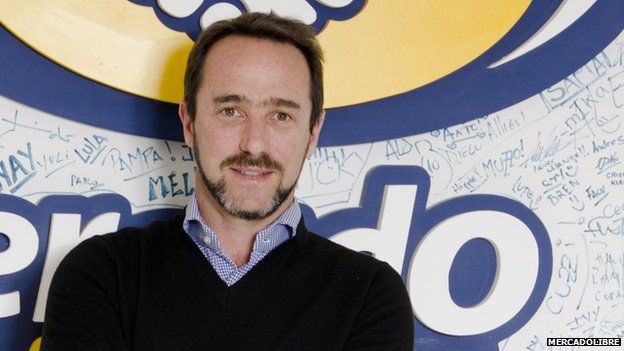The man behind the eBay of Latin America
- Published

"Marcos Galperin? Where does he work?" says the confused security guard at the entrance to the headquarters of MercadoLibre, Latin America's version of eBay.
The answer to the official's question is that Mr Galperin is not only employed by MercadoLibre, he is actually the founder and boss - and worth an estimated $400m (£267m).
In defence of the guard with a blank look on his face, 42-year-old Mr Galperin maintains a very low profile.
"I see many entrepreneurs who use their company as a platform to be famous," says Mr Galperin.
"For us it's exactly the opposite, we want the company to be famous. The lower our personal profile, the better."
And so Mr Galperin goes to work at MercadoLibre's main base in Buenos Aires wearing jeans and trainers. And he most certainly doesn't arrive in a chauffeur-driven limousine.
Deal with eBay
MercadoLibre, which means "free market" in English, was founded in 1999 in Argentina, as an online marketplace and auction house.
Mr Galperin, a native of Buenos Aires, had been inspired by US-based eBay while studying for an MBA, or master of business administration, at Stanford University in California.
Today MercadoLibre is a household name across Latin America, where it is the most visited ecommerce website.
It operates in 12 countries across the region, from Mexico in the north, down to the bottom tip of Chile in the south. And for the past four years it has also had its first European website, in Portugal.
MercadoLibre has 109.6 million registered users, and last year enjoyed annual revenues of $473m.
While this annual revenue figure is dwarfed by eBay's $16bn, MercadoLibre's turnover is growing twice as fast, as more and more people in Latin America gain access to the internet.
And back in 2001, eBay itself was impressed enough by MercadoLibre to buy a 19.5% stake. As a key part of the deal, eBay also pledged not to enter Latin America for at least five years.
Without competition from the global giant, MercadoLibre was free to go on and dominate in its region.
Key car journey
Born in Buenos Aires to a wealthy family in 1972, after finishing secondary school Mr Galperin was selected to play for Argentina's junior national rugby team.
Instead he abandoned his dream of becoming a professional rugby player, and moved to the US to study finance at the University of Pennsylvania.
Upon graduating, Mr Galperin returned to Argentina and spent three years working for YPF, one of the country's largest oil and gas companies.
But wanting to instead do something more in the field of technology, in 1997 he successfully applied to Stanford University in California's Silicon Valley. After studying eBay, the idea of creating a Spanish (and then also Portuguese) language version for Latin America was born.
Mr Galperin was quickly able to secure his first investor for MercadoLibre - thanks to a very important car journey.
A private equity boss called John Muse had been invited to speak to the MBA students at Stanford, and Mr Galperin volunteered to drive Mr Muse back to his private plane.
Mr Galperin used the journey to pitch his idea, and by the time they got to the airport where Mr Muse's jet was parked, the private equity boss had agreed to come on board.
A number of multi-million dollar investments have followed, but Mr Galperin retains one of the largest shareholdings in MercadoLibre.
Mr Galperin launched MercadoLibre when he returned to Argentina, with a number of his friends coming on board, including Pedro Arnt, who is today the company's chief finance officer.
Tough economic conditions
MercadoLibre had to immediately weather some stormy economic condtitions, which have continued to this day.
In 2000 it had to battle through the bursting of the-then global dot.com bubble, and then a year later Argentina defaulted on its international debt, something that happened for a second time earlier this year.
Yet MercadoLibre just kept on growing.
On 9 August 2007 it floated shares on New York's Nasdaq exchange, on exactly the same day which many commentators say marked the start of the global financial crisis.
For while MercadoLibre's shares were rising nicely on their debut, central banks around the world were having to inject billions of dollars in the financial markets to calm jittery investors.
Mr Galperin says there is a simple reason why the company has been able to withstand weak economic conditions.
"Volatile economies haven't hurt us thus far because we are much more dependent on the growth of broadband and mobile phones," he says.
"Internet adoption has been growing very fast in every country in Latin America."
Even the company's Venezuelan operation is said to be performing well, despite inflation in that country now running at more than 60%.
Workaholic
To get to MercadoLibre's headquarters, Mr Galperin commutes to Buenos Aires from Montevideo, the capital of neighbouring Uruguay, to where he and his wife and children moved to have a quieter family life.
The flight is just a 45-minute hop across the River Plate estuary, but Mr Galperin also often works from either home, or the firm's office in Montevideo.
A self-confessed workaholic, he says he "never detaches" himself from the business. "For me it is not a job really."
The company now has 2,000 employees, and while Mr Galperin says he demands hard work, he also wants staff to enjoy themselves.
"I like to work with people that I think are as smart, or smarter than me, but also that are fun," he says. "We work hard, but we also have a good time."